Tuesday, April 14, 2020 / 07.40AM /Bukola Akinyele for WebTV / Header Image Credit: WebTV
Africans shouldcollaborate on how to raise Liquidity in order to build infrastructure.Said the CEO of Economic Associates on a WebTV morning segmentCoronanonomicsWatch.
Speaking on theglobal development and realities on how it will impact Nigeria, the economic analyst said that there were two sides to the story, there ispandemic itself and there is a fallout from the pandemic.
The pandemicarrived in Nigeria 3 weeks ago but some of the social, economic andpolitical consequences of the pandemic arrived in Nigeria ahead of the healthchallenges. Such early challenges included the decline of the domesticcapital market, in addition to the fear and anxiety emerging from the healthpandemic itself.
The economistnoted that Nigeria didn't shut down rapidly enough after the pandemicannouncement on the Asian continent. China was locked down for threemonths. Teriba explained that the only way to prevent the disease fromspreading was through nation-wide self-isolation.
Speaking onpolicy responses and monetary policy. He said, the pandemic was characterisedby a widen divergence between the economical financial task.
The world economyhas been slowing, trade has been declining largely because of a supply glut.
He equallypointed out that a liquidity glut would impact the global economic systemby liquidity-challenged nations looking for more capital inflows in a postlockdown environment.
On theeconomy's growth for Q1 and Q2 as it concerns sub Saharan, Africaand Nigeria and how it will impact businesses and the households, the economistexplained that for Q1, Nigeria ahead of the pandemic had a slowgrowth outlook as a result of declining oil prices, combined with supply chaindisruptions and declining demand this would lead to a slow Q1 GDP growth ratein 2020.
Speaking furtheron what would happen in Q2 2020 the outcome, according to Teriba was largelyuncertain if conditions permit the lockdown in Nigeria to end in the month ofApril. Production would take some time to ramp up and input deliveries wouldrequire at least a month, thereby locking in only one month of stableproduction activity in Q2.
He was, however,optimistic that if things pick up in the second half of the year theremay be a resultant growth that may be better than last year's 2.27%.
On the presidentof International Monetary Fund [IMF] talking about recession and what mightlikely happens to Nigeria's economy Dr.Teriba said , there was a need forNigeria's economic management to align with global realities. He noted that itwas difficult to raise any revenue in the lockdown and it was going to bedifficult to do so immediately after the lock down.
Nigeria needs anopportunity to get in massive capital inflows like other African counterparts.
He spoke furtheron tight monetary policy and high domestic interest rates despite the impact ofthe COVID-19 impact on the economy. He observed that Nigeria had limitedmonetary policy leeway as a result of low external reserves and lowinternational oil price, he therefore, felt that more of the policy orientationshould tilt towards fiscal policy. Teriba advised that the main problem to solve now is to raise external liquidity to where we can regain monetary policy control.
He said,Nigeria's external liquidity was very low and that the economic managers neededto find ways to bolster liquidity in the face of persistent global conditions.Teriba said that when asset values were high Nigeria failed to attractcapital assets in good time. Asset values are low even in terms of oil sectorinvestments.
The economist wasof the opinion that Nigeria should begin to talk about its nascent assets andhow they could be turned into liquid cash flows. He noted that Nigeria had oneof the biggest continental hydro assets. The military camps and railstations abandoned in Nigeria can attract foreign investors. He said Nigeria isasset-rich.
The expert citedIndian as a country in 2018 that got $64billion in foreign direct investment inone year in form of equity and not debt. In his opinion Nigeria shoulduse equity due to the large asset base the country has to offer to strategicinvestors.
He cited theAfrican Continental Free Trade Agreement (AfCFTA) , noting that trade isa secondary issue, suggesting that for a nation to trade, it must produce andto produce it needs infrastructure. Africa's infrastructure deficiency meansthat it cannot produce thereby resulting in net trade losses.
For nations toadd value to what they produce they need infrastructure, for nations to deployinfrastructure they need liquidity. African countries, therefore, need tocooperate in how to raise liquidity to deploy infrastructure which will maketrade happen, said Teriba.
The CEO ofEconomic Associates insisted that the country and continent needed to dimensionits economic marginalisation. If economies are contracting they cannot talkabout trade because of their infrastructural deficit.
Teriba says thatNigeria should be worried about its liquidity for infrastructure and oncethis is sorted out, trade and growth will happen naturally.
Most Recent Economy & Politics / #Coronanomics Videos
Related Video
RelatedNews
1. InvestmentClusters Needed To Support Nigeria's Post COVID-19 Development - Omofaye
2. Liquidity StillThe Key Factor in Nigeria's Economic Stability in 2020 - Dr Ayo Teriba
3. UnlockingLiquidity in Nigeria - Ayo Teriba
4. UnlockingLiquidity Will Restore Growth and Stability for Nigeria – Ayo Teriba
5. Africa EconomicOutlook - Ayo Teriba
6. Nigeria Is LaggingBehind In The Race For Global Liquidity - Ayo Teriba
7. COVID-19: Short-Term Measures Have Long-TermEconomic Impacts
8. Clearing the Air on The National SocialInvestment Programme - Maryam Uwais
9. NOVA Monthly Economic Insights: Current AccountDeficit on the Run as Pressure Mounts
10. COVID-19 in Nigeria: Economic Perspectives andMitigating the Risks
11. Coronanomics: Nigeria Needs Economic Pragmatismand Robust Institutions - Dr. Temitope Oshikoya
 Lagos, NG • GMT +1
Lagos, NG • GMT +1










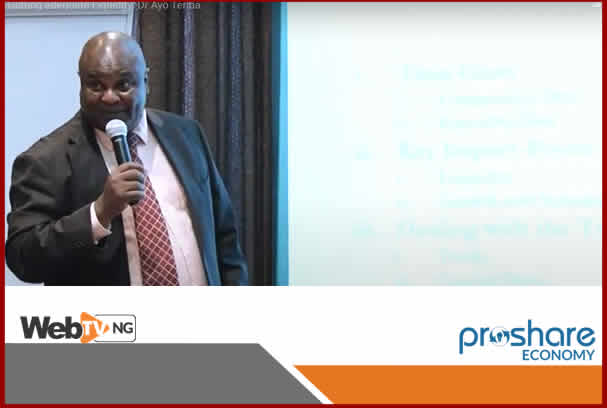
 1615 views
1615 views






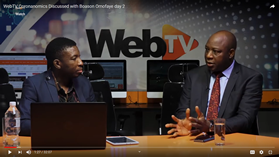
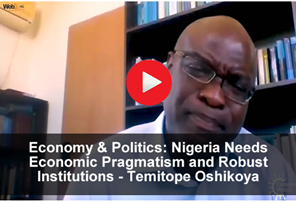
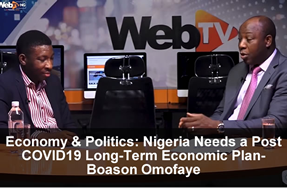
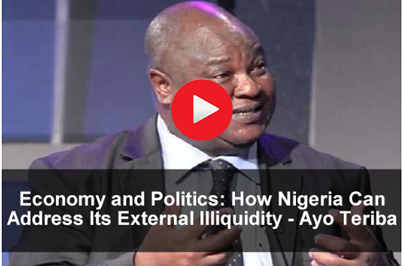








 Sponsored Ad
Sponsored Ad
 Advertise with Us
Advertise with Us









